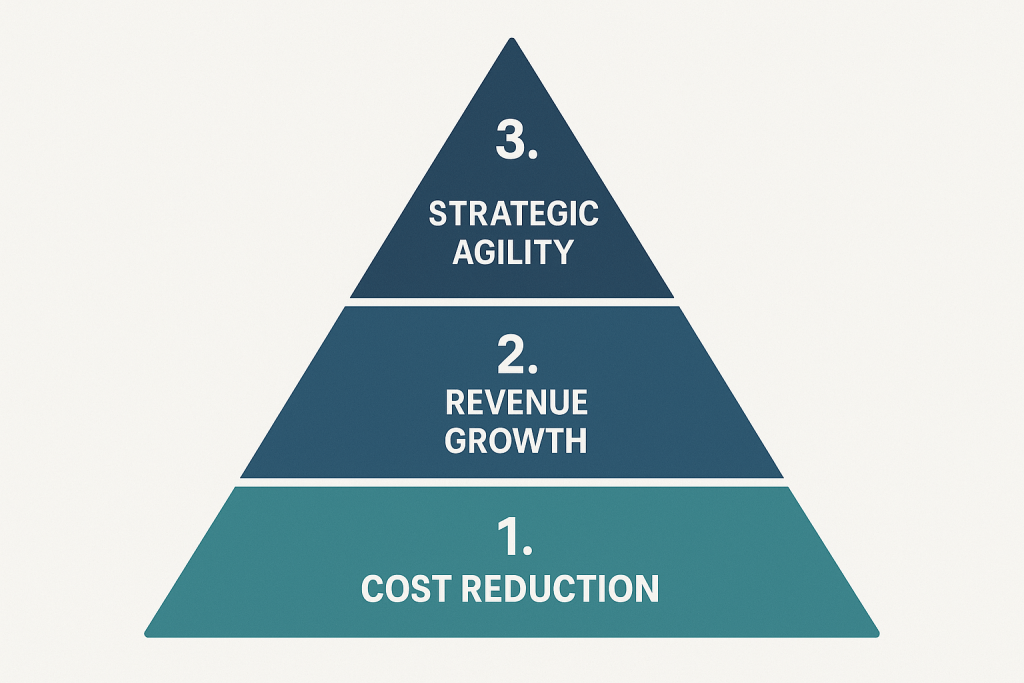Business case for AI Agents: Proven ROI, real-world case studies & strategic insights

Evaluating new technology requires a clear financial justification. The business cases for AI Agents are built on measurable results, moving beyond technical novelty to demonstrate direct impacts on cost reduction and revenue growth. This guide provides a data-supported analysis of how agentic AI and Intelligent workflows deliver tangible returns and strategic value.
What Is an AI Agent and How Does It Create Business Value?
An AI agent is an autonomous software system that uses a reasoning engine to execute multi-step tasks to achieve a specific business goal. It operates by planning actions, using external tools like APIs and databases, and learning from outcomes to automate complex, end-to-end workflows.
The business cases for AI agents are built on a direct and measurable financial impact. Unlike passive analytics tools that provide insights, AI agents function as a digital workforce that actively reduces operational expenditures, accelerates revenue-generating activities, and builds a more resilient, efficient enterprise. This guide provides a CFO-centric view of the technology, supported by real-world data and case studies.
Key Takeaways
- AI agents deliver a quantifiable average ROI of $3.70 for every dollar invested by automating operational costs and accelerating revenue-generating activities.
- The most immediate cost savings are found by deploying agents in high-volume, back-office processes like finance, IT support, and customer service.
- Beyond savings, AI agents generate new revenue by personalizing customer experiences, recovering abandoned sales, and creating new data-driven services.
- The primary role of AI agents is to augment the human workforce, automating repetitive cognitive labor to free employees for higher-value strategic and creative work.
- The strategic business case for AI agents progresses from immediate cost reduction to long-term competitive advantage achieved through superior operational speed and agility.
How Do AI Agents Drive Tangible ROI Across the Enterprise?
The primary driver for any new technology investment is its financial return. The ROI of AI agents is not speculative; it is a quantifiable figure derived from concrete improvements in operational efficiency and revenue generation.
Where do AI agents deliver the most significant cost savings?
AI agents for business deliver substantial cost savings by automating high-volume, repetitive cognitive tasks, particularly in back-office operations, customer service, and marketing and sales.
- Automating Financial Operations: In the finance department, AI agents can automate invoice processing, account reconciliation, and expense report auditing. At United Wholesale Mortgage, the deployment of AI agents on Google’s Vertex AI platform nearly doubled underwriter productivity in just nine months. This directly translates to lower labor costs per loan processed and faster closing times.
- Improving Customer Support Efficiency: An advanced voice AI agent can run multiple outbound sales or support calls simultaneously, a massive increase in outreach speed, while also booking meetings and updating CRM records in real time. This reduces the cost-per-interaction and allows human agents to focus on complex, high-value customer problems.
- Reducing IT and Cloud Expenditures: In IT operations, agents automate service ticket resolution and manage cloud resource allocation. An agent can be configured to continuously monitor cloud usage and automatically decommission underutilized servers, directly cutting monthly infrastructure costs without human intervention.
How Do AI Agents Generate New Revenue?
Beyond cost reduction, the agentic AI business value is clearly demonstrated through its ability to accelerate revenue-generating activities and create entirely new business opportunities.
- Cart Abandonment Recovery Agents: AI agents can reduce cart abandonment by 40% through intelligent intervention strategies. These agents track customer behavior in real-time and deploy personalized recovery tactics within minutes of abandonment detection. The financial impact is substantial, with global cart abandonment losses projected to reach$4.6 trillion by 2025, even modest recovery improvements translate to millions in additional revenue for large retailers.
- Visual Merchandising and Personalization Agents: AI agents boost e-commerce efficiency, with 69% of retailers seeing higher profits through smart personalization. Visual merchandising agents dynamically adjust online storefronts by personalizing layout, banners, and product positioning based on individual user behavior and preferences. These agents create unique browsing experiences for every visitor, significantly enhancing engagement and driving higher average order values through intelligent product recommendations and dynamic pricing strategies.
- Sales Acceleration and Lead Qualification: At marketing firm Monks Agency, using Google Gemini in an agentic workflow delivered an 80% improvement in click-through rates and a 31% improved cost-per-purchase for clients. This is achieved by automating research, personalizing outreach, and optimizing campaign performance in real time. AI-powered support AI Agents are providing immediate responses and qualifying prospects automatically, allowing sales teams to focus on the closing.
- Revenue Stream Diversification: AI agents for business can become the foundation for entirely new revenue streams. Deutsche Bank’s DB Lumina agent accelerates the creation of complex research reports from days to minutes, offering a high-value service to its financial clients. Similarly, eCommerce retailers generate between 10% to 30% of their revenue from suggestive selling, where agentic commerce engines excel at identifying cross-sell and upsell opportunities in real-time.
- Market Expansion and Customer Lifetime Value: The global AI in e-commerce market is expected to reach $9.01 billion by 2025, driven by businesses using AI agents to expand into new markets and increase customer lifetime value. Around 70% of consumers said they would use AI agents to purchase flights, and 65% would use them to book hotels, demonstrating strong consumer acceptance for AI-driven purchasing experiences that can unlock new revenue opportunities in previously underserved segments.
ROI Impact Metrics
According to Microsoft’s research, companies implementing AI agents achieve an average ROI of $3.70 for every $1 invested, with top performers reaching $10 for every$1 spent. Enterprise AI transformation studies show that 73% of enterprises achieve $2.4 million in average annual savings within 18 months of implementation.
These complex AI agent workflows represent the evolution from simple automation to intelligent, autonomous systems that can handle multi-step processes, make contextual decisions, and continuously improve their performance through machine learning.
Other business use cases of Complex AI Agents and Agentic Workflows

Healthcare Operations
- Medical Diagnosis Agents: Analyze patient symptoms, medical histories, and lab results to assist physicians with diagnosis, reducing diagnostic time by 40-60% and improving accuracy rates
- Remote Patient Monitoring Agents: Continuously monitor patient vitals through IoT devices, automatically alerting medical staff to critical changes and reducing hospital readmission rates by 25-30%
- Clinical Trial Matching Agents: Match patients to appropriate clinical trials based on medical history and eligibility criteria, accelerating recruitment by 50% and reducing administrative costs
Financial Services Automation
- Fraud Detection Agents: Process thousands of transactions simultaneously, identifying suspicious patterns in real-time with 95% accuracy while reducing false positives by 60%
- Investment Advisory Agents: Analyze market data, portfolio performance, and client risk profiles to provide personalized investment recommendations, handling 10x more client portfolios per advisor
- Loan Processing Agents: Automate document verification, credit scoring, and approval workflows, reducing processing time from weeks to hours while maintaining compliance standards
Manufacturing and Supply Chain
- Predictive Maintenance Agents: Monitor machinery sensors to predict equipment failures before they occur, reducing unplanned downtime by 70% and maintenance costs by 25%
- Supply Chain Optimization Agents: Continuously analyze demand patterns, inventory levels, and supplier performance to optimize procurement and reduce carrying costs by 15-20%
- Quality Control Agents: Use computer vision to inspect products at production speed, detecting defects with 99.5% accuracy while reducing inspection labor costs by 80%
Customer Experience and Sales
- Sentiment-Aware Chat Agents: Handle customer inquiries with emotional intelligence, escalating complex issues appropriately while resolving 80% of routine queries autonomously
- Lead Qualification Agents: Score and nurture leads automatically, increasing qualified lead conversion rates by 35% while reducing sales team workload
- Cart Abandonment Recovery Agents: Analyze customer behavior patterns and deploy personalized retention strategies, recovering 25-30% of abandoned purchases
Human Resources and Talent Management
- Recruitment Agents: Screen resumes, conduct initial candidate assessments, and schedule interviews, reducing time-to-hire by 50% while improving candidate quality scores
- Employee Onboarding Agents: Guide new hires through paperwork, training modules, and integration processes, reducing onboarding time from weeks to days
- Performance Management Agents: Continuously analyze employee performance data, providing managers with actionable insights and early intervention recommendations
Insurance and Risk Management
- Claims Processing Agents: Automatically review claim documents, verify coverage, and process payments for routine claims, reducing processing time and operational costs.
- Policy Matching Agents: Analyze customer profiles and recommend optimal insurance products, increasing cross-sell success rates.
- Risk Assessment Agents: Continuously monitor policyholder behavior and external risk factors to adjust premiums and prevent losses
Real Estate and Property Management
- Property Valuation Agents: Analyze market data, comparable sales, and property characteristics to provide instant valuations with 90% accuracy
- Virtual Tour Agents: Guide potential buyers through properties remotely, qualifying prospects and scheduling in-person visits only for serious buyers
The Agent ROI Pyramid: A Strategic Framework for CFOs
To build a comprehensive business case for AI agents, it is useful to think of their value in three distinct tiers, moving from immediate cost savings to long-term strategic advantage.

- Cost Reduction (The Base): This is the foundational, most easily measured ROI. It comes from automating repetitive, high-volume tasks like data entry, invoice processing, and routine customer service inquiries.
- Revenue Growth (The Middle): This tier focuses on using agents to accelerate sales cycles, improve customer retention through personalization, and create new AI-driven product offerings.
- Strategic Agility (The Peak): This is the highest level of value. It represents the ability to use an agentic workforce to scale operations instantly, enter new markets quickly, and make better corporate decisions based on real-time, agent-gathered market intelligence.
How do AI Agents Differ from Traditional RPA?
While both technologies automate tasks, AI agents and Robotic Process Automation (RPA) are fundamentally different. Understanding this distinction is critical for making the right investment.
- RPA Follows Rules: RPA is designed to automate structured, repetitive tasks by following a predefined script. It is like a robot on an assembly line, perfectly performing the same action over and over. It excels at tasks like copying data from a spreadsheet to a CRM.
- AI Agents Make Decisions: AI agents are designed for dynamic processes that require reasoning and adaptation. They are like a factory floor manager who can handle unexpected problems, make decisions based on new information, and coordinate multiple different tasks to achieve a goal.
How to build an AI Agent for my business?
A successful AI agent adoption strategy begins with a well-researched and financially sound business case.
Step 1: How do you identify a high ROI business case for AI Agents?
- Target High-Volume, Repetitive Processes: Start by identifying workflows that are manual, rule-based, and consume a significant number of employee hours. A prime example is an accounts payable process where an agent can read a PDF invoice from an email, match it to a PO number in SAP, and schedule the payment.
- Find Processes with Clear Financial Impact: Prioritize use cases where automation has a direct and measurable effect on cost or revenue. Automating sales lead follow-up sequences in Salesforce is an excellent starting point because the impact on conversion rates is clear.
- Begin with Low-Risk, Internal-Facing Functions: It is often prudent to start with back-office departments. This allows you to prove the technology’s value and refine your governance model in a controlled setting before deploying agents in more sensitive, customer-facing roles.
Step 2: How do you estimate the costs and required resources?
- Conduct a Build-vs-Buy Analysis: Compare the total cost of ownership (TCO) of licensing a ready-to-use SaaS agent platform against the cost of building a custom solution with in-house developers using frameworks like LangChain or Microsoft AutoGen.
- Account for Governance and Security: The AI agent implementation costs must include the budget for necessary governance tools, monitoring platforms, and security reviews. This is a critical and often overlooked expense.
- Identify Necessary Human Skills: Determine if your current team has the required skills or if you need to hire or train personnel in areas like prompt engineering, AI governance, and MLOps to support the agentic systems.
How to Build a Human-AI Collaborative Workforce
The goal of deploying AI agents is not to replace people, but to augment them. Building a successful human-AI team requires a deliberate approach to redefining roles and training your staff.
- Redefine Job Roles: Clearly distinguish between tasks best suited for agents (repetitive, data-intensive) and those best for humans (complex problem-solving, strategic thinking, building relationships).
- Focus on “Human-Only” Skills: Invest in training programs that sharpen employees’ skills in areas where humans excel, such as critical thinking, creativity, and emotional intelligence.
- Implement Oversight Training: Teach employees how to manage and supervise their new digital colleagues. This includes training on how to interpret agent outputs, identify anomalies, and manage escalations effectively.
What Are Common Misconceptions About the Business Value of AI Agents?
- Myth: “AI agents are just for big companies.”
- Reality: This is outdated thinking. The rise of no-code and SaaS platforms has dramatically lowered the cost and complexity of deploying AI agents. Many solutions are now subscription-based, making them accessible to small and medium-sized businesses without large upfront capital investment.
- Myth: “AI agents will replace our employees.”
- Reality: The primary business case for AI agents is augmentation. Agents are best used to handle the repetitive, administrative parts of a job, which frees human employees to be more strategic and productive. This leads to higher-value work, not mass unemployment.
- Myth: “The ROI for AI Agents is too speculative to measure.”
- Reality: The ROI for AI Agents for well-chosen use cases is highly tangible. Metrics like reduced processing time per invoice, lower error rates in data entry, and increased conversion rates from automated lead follow-ups are all directly measurable and can be tied to financial performance.
In conclusion, the business case for AI agents is clear, quantifiable, and urgent. For organizations that invest in the technology and the governance required to manage it, AI agents offer a direct path to lower costs, higher revenue, and a lasting strategic advantage in the modern economy.




